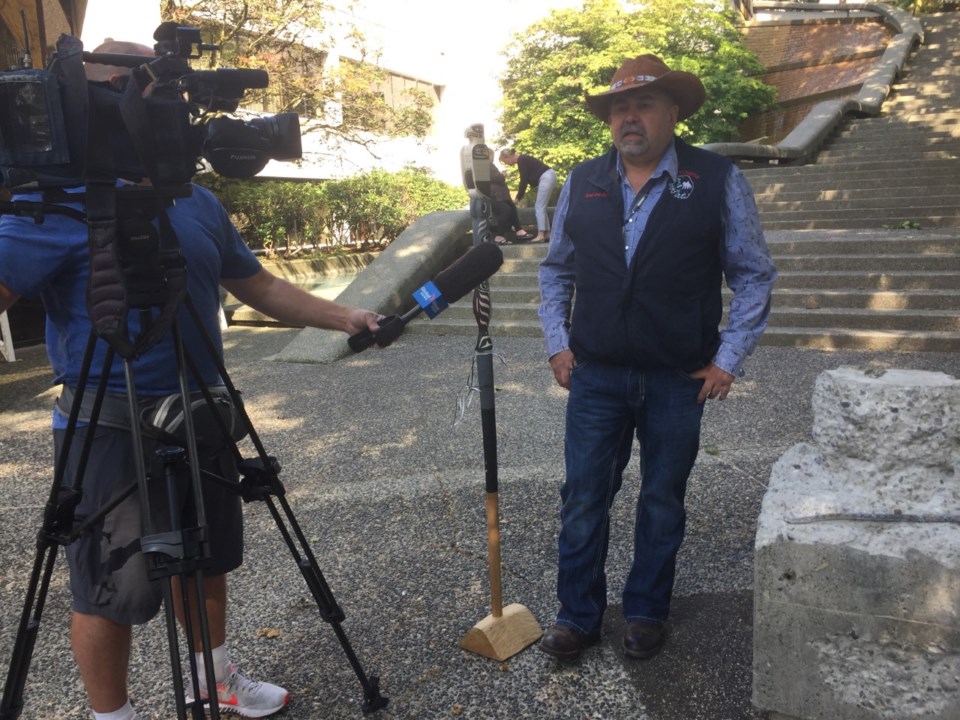A Tsilhqot’in chief who was wrongly tried for murder and hanged in New Westminster 154 years ago has been commemorated as a hero.
The City of New Westminster hosted members of theTsilhqot’in Nation, who travelled to New West to honour Chief Ahan, who was hanged in downtown New Westminster on July 18, 1865.
“154 years ago he was buried here outside the courthouse, without any of his people or his family. For all of us to come here, all of our members to honour him – his spirit is here,” said Chief Joe Alphonse – Tl’etinqox (Anaham). “He is probably standing amongst us today. He is probably grateful that people have not forgotten.”
Ahan was one of six Tsilhqot'in warriors who were executed following the Chilcotin War, between the Tsilhqot'in people and European settlers, which occurred in the Cariboo Chilcotin Coast of B.C. Five of the chiefs were executed in Quesnel in October 1864, while Ahan was hanged in New Westminster the following year.
Three of the six current Tsilhqot’in Nation’s chiefs attended Thursday’s ceremonies in New Westminster. They commemorated Ahan as a warrior who defended their people against colonizers who abused their women and mistreated their people.
“He made the ultimate sacrifice for his territories, his lands, his people – life,” Alphonse said.
Following a ceremony that included prayers, a drum song and a warrior song, dozens of people crossed the street to today’s courthouse, where they gathered at the spot where a Judge Begbie statue stood until two weeks ago.The chiefs thanked the City of New Westminster for showing leadership by removing the statue and showing a path for other cities to follow with reconciliation.
Chief Jimmy Lulua – Xeni Gwet’in (Nemiah) said Begbie represents the disrespect, mistreatment and abuse that were inflicted on Tsilhqot’in people.
“This might just look like a hunk of rock but for us – means a lot more to people,” he said of the statue’s cement base.
Alphonse said the statue only represented one side of the story.
“Our side of the story hasn’t be told. What this guy represented was sticking up and protecting laws, but not our laws. Our warriors who were executed were protecting our laws, when our women were violated,” he said. “If you are going to tell the story, tell the full story. We want to be part of that.”
Following the gatherings in downtown New Westminster, the City of New Westminster held an official ceremony at New Westminster Secondary School to commemorate the wrongful trial and hanging of Ahan. It’s believed Ahan could be buried at the high school site, which was once a cemetery site.
Alphonse said the Tsilhqot’in have asked the school district to guarantee them that a DNA sample will be taken if any bones are found at the high school site.
“If those happened to be Chief Ahan’s bones, then we want them returned to us,” he said. “They brought Chief Ahan down here by horseback, so our plan was to bring him home on horseback. We’d ride him home.”
Once the school is built, it must be named after Ahan, Alfonse said.
“When that school is finally built, we’ve told you guys to name it Chief Ahan. I’m going to keep on insisting on that until that happens. People say, ‘we have to have a policy’ – bullshit. If you want to kill something, you form a committee,” he said. “I am here to tell you, this is what we want.”
School district’s secretary-treasurer Kim Morris pointed out two different locations that are potential burial sites for Chief Ahan. Once the new school is built and the existing high school is demolished, she said that portion of the site will be a passive park where people can quietly reflect.
Lulua said it means a lot for Tsilhqot’in people to be able to visit their ancestor.
“This is a very special day for our nation,” he said. “We can come to visit our own ancestors that have gone through the wrongs of the past history.”
Lulua said it means a lot to the Tsilhqot’in people to basically have a funeral for Chief Ahan and pay their respects to him through prayers and song, and to say farewell at his burial site – and to know it’s a place they and future generations will be able to visit to pay their respects.
In October 2014, the provincial government formally apologized in the legislature to the Tsilhqot’in Nation for the arrest and hanging of six of its war chiefs.
In March 2018, Prime Minister Justin Trudeau issued an apology, recognized the six chiefs and absolved the Tsilhqot'in leaders of any wrongdoing, saying they were treated and tried as criminals in an era where both the colonial government and the legal process did not respect the inherent rights of the Tsilhqot'in people.
Lulua thanked the City of New Westminster and the New Westminster Board of Education for their efforts, saying the ceremony is “a big step in First Nations history.”
“Our people have been looking forward to this day for a long, long time,” he said. “Every Tsilhqot’in member who is born learns about the Chilcotin War, learns about the wrongdoing of how our people have been treated. I always say there is a turning point in history. That day is today. That day was March 26 last year when Trudeau came and exonerated our war chiefs.”



